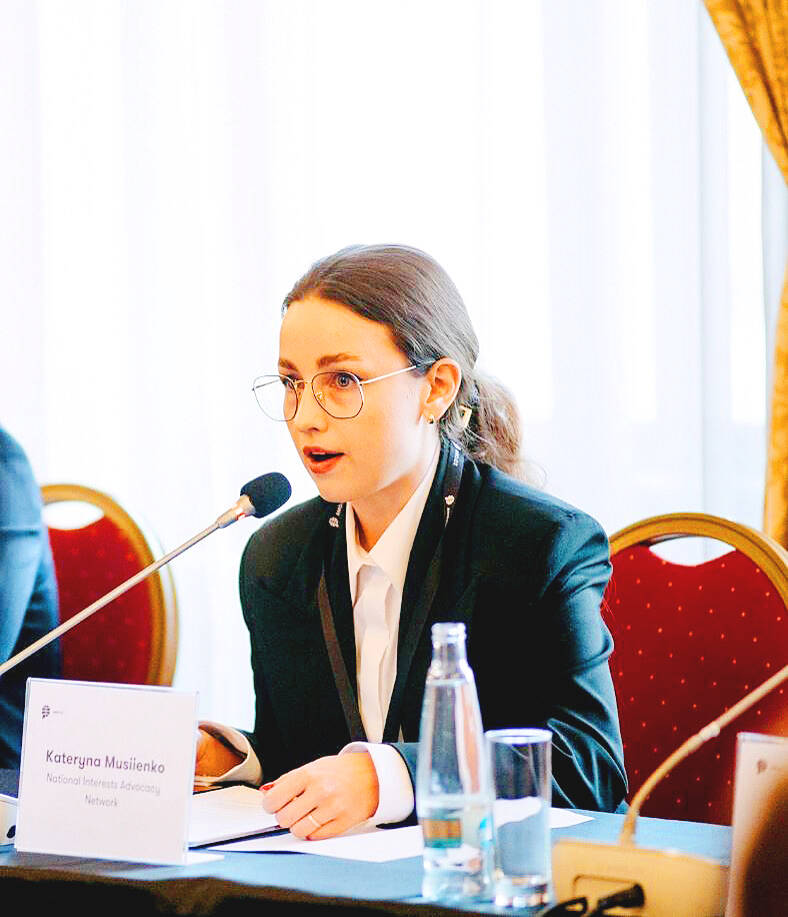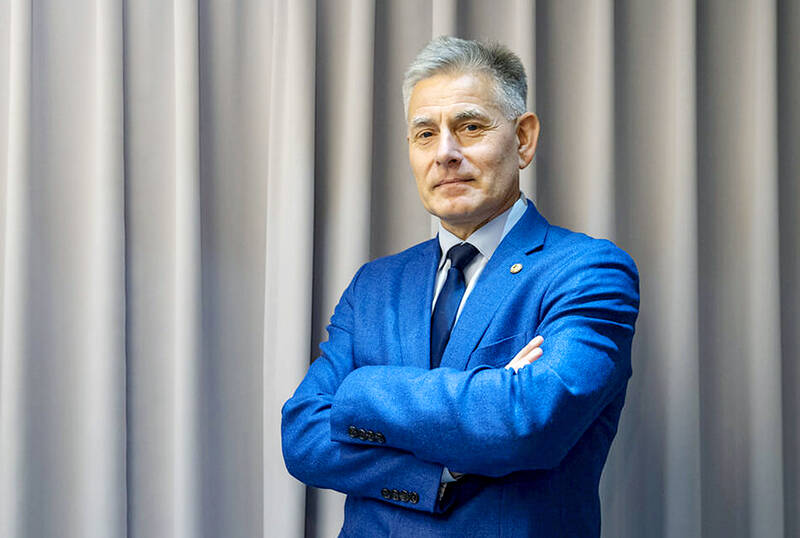China is studying the tactics Russia is using in its war against Ukraine, a Ukrainian representative said at a workshop in Taipei yesterday, adding that Taiwan should plan its defense under the assumption that Beijing would employ similar methods in an invasion.
The workshop, titled “Ukraine & Taiwan: Hybrid Warfare and Democratic Resilience Strategy,” was organized by Taipei-based non-governmental organization Doublethink Lab. Representatives of the National Interests Advocacy Network (ANTS), a Ukrainian nonprofit organization working to support Ukraine’s democratic transformation and European integration, were invited to share lessons learned from the Russia-Ukraine war.
Kateryna Musiienko, head of foreign affairs at ANTS, said that the Russia-Ukraine war is the world’s first major “drone war,” with the extensive use of uncrewed aerial vehicles on both sides.

Photo: screen grab from Kateryna Musiienko’s Facebook page
Russia leans heavily on Iranian Shahed Kamikaze drones and launched more than 34,000 from January to September, nine times more than the same period last year, Musiienko said.
Russia sees drone swarms as a cost-effective weapon, as a US$400 FPV drone can destroy a tank that costs US$2 million, she said.
In September, an average of 188 Shahed drones were launched, inundating the Ukrainian air defense system, she added.

Photo: CNA
The Russia-Ukraine war coincides with the era of “transparent battlefields,” in which slight military moves would be quickly detected and sabotaged by drones in real time, Musiienko said.
As such, Ukraine can quickly adapt and deliver strategies that would win the war, she said.
Musiienko said that Ukraine’s TB2 drones were effective in early 2022, but within months Russia’s layered air defense and jamming made them nearly unusable in strike missions. Ukraine subsequently used TB2s for reconnaissance tasks and smaller drones for attacks.
The “adaptation race” was also seen after Russia began using FPV attack drones in 2023. Ukraine later countered them with drone interceptors, prompting Russia to readjust again, she said.
As to the implications of the Russia-Ukraine war for Taiwan, Musiienko said that China is studying Russia’s war lessons to apply against Taiwan, from mass drone swarms and missile barrages to potential blockade tactics.
Taiwan must assume that these tactics would be used against it, she said.
Taiwan should also maximize asymmetric warfare capabilities, she added.
“Ukraine’s experience proved the value of the whole-of-society approach, fostering broad civil resistance and having territorial anti-drone units,” Musiienko said.
Taiwan and Ukraine should form technology partnerships in drones, cybersecurity, satellite communications and resilient infrastructure, she said, adding that the two nations should jointly cultivate next-generation talents skilled in defense technology and crisis management.
Andrii Ordynovych, a retired Ukrainian Air Force colonel currently working with the Ukrainian Freedom Fund, said that what Ukraine failed to achieve five years ago was to create a condition for Western democracies to be interested in the nation.
It should have placed Ukraine in a strategically important position, given that it has the largest gas storage capacity in Europe, he said.
Ordynovych highlighted the importance of building trust and partnerships with like-minded democracies when fighting asymmetric warfare.
“When the war first began with Russia taking over Crimea in 2014, we received only nonlethal security assistance. After the full-scale war began in 2022, we were not able to receive offensive-defensive hardware from Western politicians due to a general lack of confidence in the Ukrainian leadership,” he said. “However, once we showed democratic allies that we are highly responsible for getting security in Ukraine and would not misuse funds appropriated to us, we started getting Javelin and weapons that are defensive in nature, but have lethal effects. It was meant to be a clear indication to Russia that Ukraine is not going to be abandoned.”
Although the situations in Taiwan and Ukraine are different, Taiwan should be ready to fight asymmetric warfare by building efficient and feasible relationships with security partners, seeking to build a security pact similar to Article 5 of NATO with neighboring nations facing security threats from China, and using strategic communications to boost the public’s morale, he said.
The government and civilians should all be trained on the rules of engagement under various hypothetical scenarios, he added.
ANTS executive director Lyusyena Shum said that Russia is seeking to conduct “culture genocide” through the war with Ukraine, adding that ANTS is documenting destruction and damage of cultural artifacts.
More than 2,500 cultural infrastructure and facilities — including libraries, museums and theaters — have been damaged, about 1,600 of which are cultural heritage sites designated by the Ukrainian government and UNESCO, Shum said, adding that1,070 libraries were damaged or destroyed, with nearly 200 fully destroyed.
More than 230 Ukrainian writers and artists have been killed, with some of them being tortured to death, while 118 media workers have been killed by Russia, she said.
About 2,000 school libraries and 300 universities have also been damaged, she added.
Apart from stealing cultural artifacts, Russia has destroyed 4.5 million Ukrainian books, particularly targeting books published after the Ukrainian revolution of dignity in 2013, as well as those on the geography, culture and history of Ukraine, she said.

ALIGNED THINKING: Taiwan and Japan have a mutual interest in trade, culture and engineering, and can work together for stability, Cho Jung-tai said Taiwan and Japan are two like-minded countries willing to work together to form a “safety barrier” in the Indo-Pacific region, Premier Cho Jung-tai (卓榮泰) yesterday said at the opening ceremony of the 35th Taiwan-Japan Modern Engineering and Technology Symposium in Taipei. Taiwan and Japan are close geographically and closer emotionally, he added. Citing the overflowing of a barrier lake in the Mataian River (馬太鞍溪) in September, Cho said the submersible water level sensors given by Japan during the disaster helped Taiwan monitor the lake’s water levels more accurately. Japan also provided a lot of vaccines early in the outbreak of the COVID-19 pandemic,

Kaohsiung Mayor Chen Chi-mai (陳其邁) on Monday announced light shows and themed traffic lights to welcome fans of South Korean pop group Twice to the port city. The group is to play Kaohsiung on Saturday as part of its “This Is For” world tour. It would be the group’s first performance in Taiwan since its debut 10 years ago. The all-female group consists of five South Koreans, three Japanese and Tainan’s Chou Tzu-yu (周子瑜), the first Taiwan-born and raised member of a South Korean girl group. To promote the group’s arrival, the city has been holding a series of events, including a pop-up

TEMPORAL/SPIRITUAL: Beijing’s claim that the next Buddhist leader must come from China is a heavy-handed political maneuver that will fall flat-faced, experts said China’s requirement that the Dalai Lama’s reincarnation to be born in China and approved by Beijing has drawn criticism, with experts at a forum in Taipei yesterday saying that if Beijing were to put forth its own Dalai Lama, the person would not be recognized by the Tibetan Buddhist community. The experts made a remarks at the two-day forum hosted by the Tibet Religious Foundation of His Holiness the Dalai Lama titled: “The Snow Land Forum: Finding Common Ground on Tibet.” China says it has the right to determine the Dalai Lama’s reincarnation, as it claims sovereignty over Tibet since ancient times,

Temperatures in some parts of Taiwan are expected to fall sharply to lows of 15°C later this week as seasonal northeasterly winds strengthen, the Central Weather Administration (CWA) said today. It is to be the strongest cold wave to affect northern Taiwan this autumn, while Chiayi County in the southwest and some parts of central Taiwan are likely to also see lower temperatures due to radiational cooling, which occurs under conditions of clear skies, light winds and dry weather, the CWA said. Across Taiwan, temperatures are to fall gradually this week, dropping to 15°C to 16°C in the early hours of Wednesday